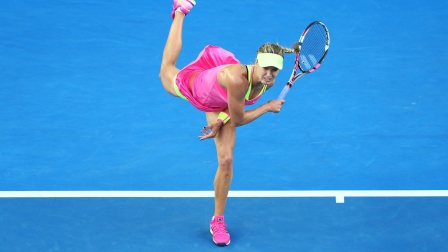The Results Are In: Sports Reporting Is As Sexist As You’ve Always Suspected
After winning a match at the Australian Open tennis tournament in 2015, Canadian tennis star and Wimbledon runner-up Eugenie Bouchard buried her head in her hands following an unusual request by the male interviewer.
“Can you give us a twirl and tell us about your outfit?” he asked, during the on-court interview.
“A twirl?” repeated the then-seventh world ranking female tennis player, smiling uncomfortably.
“A twirl, like a pirouette, here you go,” he said.
In spite of the monumental achievements of individual athletes and female athletics as a whole, the way in which they are presented in the media remains drastically different than the way their male counterparts are portrayed.
That discrepancy is on full display at the Olympics in Rio, and on television sets, radio broadcasts, and web browsers around the world. As the world’s top male and female athletes compete side by side, it becomes difficult to ignore how the coverage they receive is anything but equal.
In fact, a recent study by the Cambridge University Press analyzed the language used to describe athletes in the media, and found significant discrepancies.
“Notable terms that cropped up as common word associations or combinations for women, but not men, in sport include ‘aged,’ ‘older,’ ‘pregnant,’ and ‘married’ or ‘unmarried,” the report explains. “The top word combinations for men in sport, by contrast, are more likely to be adjectives like ‘fastest,’ ‘strong,’ ‘big,’ ‘real,’ and ‘great’—all words regularly heard to describe male Olympians.”
The study concludes that women are more likely to be referred to as “girls” while men are rarely referred to as “boys” by the newscasters tasked with covering their sport.
“When it comes to performance, it seems as though men also have the competitive edge: We see ‘men’ or ‘man’ associated with verbs such as ‘mastermind,’ ‘beat,’ ‘win,’ ‘dominate,’ and ‘battle,’ whereas ‘woman’ or ‘women’ is associated with verbs such as ‘compete,’ ‘participate,’ and ‘strive,” adds the report.
The study analyzed over 160 million words used within the domain of sport in the Cambridge English Corpus, the University’s multibillion-word collection of written and spoken English often used to explore how language is used in the modern era.
“The breadth of sources we’ve analyzed means we’re able to give a unique insight into the language used to describe women and men within the context of sport,” said Sarah Grieves, a language researcher at Cambridge University Press, in a statement about the study.
“It’s perhaps unsurprising to see that women get far less airtime than men, and that their physical appearance and personal lives are frequently mentioned. It will be interesting to see if this trend is also reflected in our upcoming research on language used at the Rio Olympics.”
Such subtle gender biases in language are common far beyond the world of sport, and have been identified in arenas ranging from tech-industry recruiting emails to Wikipedia entries. In fact, women are judged on their appearance twice as much as men, both in sport and in business. When it comes to performance reviews, double standards for language abound. Women are often labeled “abrasive,” while men rarely if ever hear that word to describe their manner.
Some argue that Hoda Kotb’s blatant objectification of Pita Taufatofua—the taekwondo competitor and flag-bearer for Tonga—during NBC’s Olympic coverage might have leveled the playing field. However, it’s tough to change behaviors when 45% of participants in this year’s Games are female, but only 21% of those covering the Rio Olympics are women.
As the study noted:
While some sports may have made strides toward equality, with tennis now offering the same prize money for men and women, research suggests we will be discussing the length of Heather Watson’s skirt, rather than her chances of winning the first U.K. women’s gold medal in tennis since 1908. Language around women in sport focuses disproportionately on the appearance, clothes, and personal lives of women, highlighting a greater emphasis on aesthetics over athletics.
Fast Company , Read Full Story
(52)













